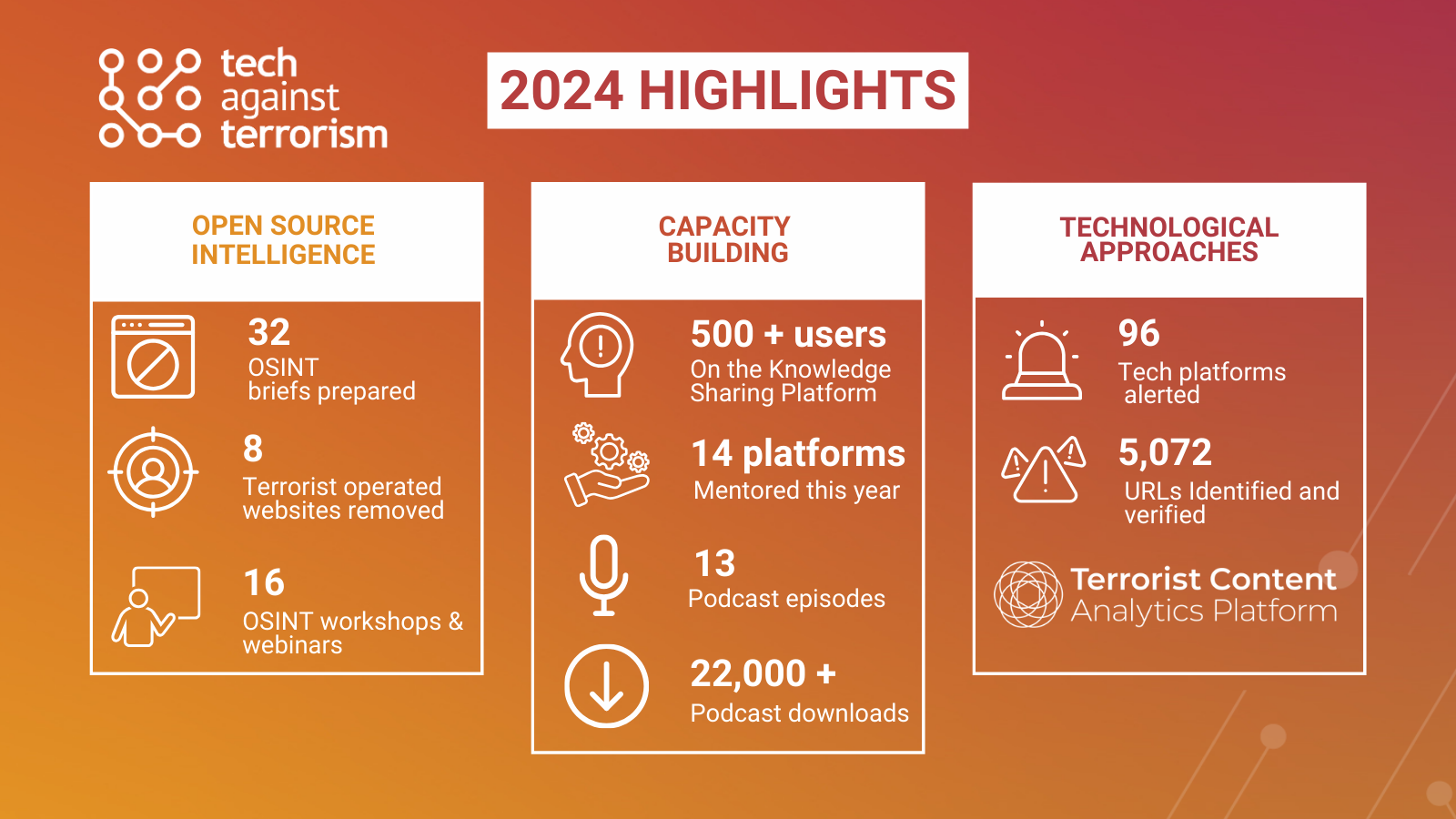Disrupting Terrorism Online in 2024
A review by Adam Hadley CBE, Executive Director, Tech Against Terrorism. Dear partners and stakeholders,
A review by Adam Hadley, Executive Director, Tech Against Terrorism.
Dear partners and stakeholders,
As another year disrupting terrorism online draws to a close, the storm clouds are far from having passed. While the overall presence of terrorist groups on major platforms has stabilised, continued adversarial shifts persists, as we revealed in October with the terrorist and violent experimentation of generative AI. More worrying is the proliferation of terrorist-operated websites. Hundreds exist, evading oversight. This undermines wider counterterrorism efforts online. Urgent multilateral cooperation is needed to address this blind spot.
All of these challenges converged on and after the Hamas attack in Israel on 7 October. The critical role of messaging platforms came under particular focus, as did a need to review government and industry crisis responses. As an organisation charged with continuously monitoring the threat, we are now looking to build a 24/7 crisis response capability and establishing policies to uphold the dignity of victims online.
At Tech Against Terrorism, we stepped up our work to ensure public and private sector effectively challenge the threat landscape. The Terrorist Content Analytics Platform, developed with support from Public Safety Canada, now alerts over 100 platforms to new terrorist content found by our intelligence analysts. We also launched Tech Against Terrorism Europe to support implementation of regulations like the EU’s Terrorist Content Online regulation.
We announced major new partnerships this year. With Microsoft, we are piloting an AI-powered tool to detect terrorist content at scale. With Google Jigsaw, we are building Altitude to give platforms an elevated view of terrorist and violent extremist content on their sites. These demonstrate the power of cross-sector collaboration.
What worries us most looking ahead is the potential for generative AI to upend existing counterterrorism approaches. The technology could enable groups to automatically generate content that evades current detection methods. However, as our partnerships show, AI also presents opportunities to counter this threat.
For all of us, 2024 looks likely to test the mettle of our counterterrorism structures further still. But through continued partnerships, innovation and vigilance, I remain convinced we can weather whatever storms may come.
Yours sincerely,
Adam Hadley
Executive Director, Tech Against Terrorism
As part of our effort to bring about sustainable action to disrupt terrorists online, we took our agenda to policymakers and influential forums around the world:
Delivered high profile briefings: including presentations for French President Emmanuel Macron at the Elysée Palace on generative AI; for Secretary Hillary Clinton and President Bill Clinton at Swansea University and the United Nations on the threat of Terrorist Operated Websites.
International recognition: Our work with tech platforms was cited in a communiqué issued by G7 interior and security ministers in Japan. We also helped shape the international conversation, with our standpoint and work cited in outlets including BBC News, Wired, The Times and Financial Times among others.
Impactful technical approaches: We announced our partnerships with Microsoft to improve terrorist content detection and Google’s Altitude to help tech platforms protect their communities.
Tech platform engagement: We organised a series of events including the Southeast Asia Workshop on Counterterrorism with Meta and GIFCT, participated and presented in top industry events such as the Trust & Safety Professional Association APAC Summit in Singapore and the Oxford Generative AI Summit.
Advocating to policymakers: We launched the Terrorist Content Analytics Platform in Ottawa and co-hosted a panel discussion on Ungoverned Spaces online at the United Nations CT Week, took part in the Christchurch Call Leaders’ Summit at the Paris Peace Forum and the Oxford Generative AI Summit.
As we bid farewell to 2023, our teams also reflect on a year marked by significant accomplishments:
%20(7).png?width=623&height=350&name=LinkedIn%20-%20Info%20post%20(portrait)%20(7).png)
Open Source Intelligence: The team took their threat intelligence to the next level, deepening its capabilities in identifying, tracking, and disrupting terrorist activity online. They focused on emerging technologies, and for the first time, began tracking terrorists’ early adoption of Generative AI (GenAI). The team have remained at the forefront of disrupting terrorist operated websites and have successfully facilitated the removal of dozens of websites created for sharing terrorist propaganda.
Capacity Building: We expanded the resources and capacity to support tech platforms deal with terrorism online. Most notably, our Policy Advisory and Research team led Tech Against Terrorism’s participation in the 'TATE' consortium. We expanded the Knowledge Sharing Platform with exclusive policy resources, including a toolkit on online counterterrorism and human rights. Whilst proposing an increased number of free policy resources, the team have continued their direct engagement with tech companies providing them with bespoke policy advisory to adapt their counterterrorism framework to the constantly changing threat environment and regulatory landscape.
Technological Approaches: In 2023, the Terrorist Content Analytics Platform underwent a substantial expansion, introducing a tiered system to boost analytical capabilities for platforms. This enhancement enables platforms to quickly identify and prioritise alerted material for efficient moderation. Under their expanded Inclusion Policy, TCAP reported content from unofficial media outlets supporting terrorist groups, alongside notifying platforms about instructional material linked to attack preparation.
Who Designates Terrorism? The Need for Legal Clarity and Transparency to Moderate Terrorist Content Online (March 2023)
Patterns of Online Terrorist Exploitation (April 2023)
The Disruption Report (July 2023)
Terrorist Content Analytics Platform: Second Annual Transparency Report (August 2023)
Early Terrorist Adoption of Generative AI (November 2023)

Our 2023 State of Play report will chart principal shifts in terrorist and violent extremist behaviour and tactics online. It also aims to inform more comprehensive cross-industry efforts to counter terrorist exploitation of the internet. Fill out your details to receive our report in early January:
Would you like to stay up to date with Tech Against Terrorism in 2024? Subscribe to our newsletter to receive monthly updates on our work.

A review by Adam Hadley CBE, Executive Director, Tech Against Terrorism. Dear partners and stakeholders,
Tech Against Terrorism, a UN-backed online counterterrorism organisation, gives its reaction to the updated UK’s Counterterrorism Strategy, CONTEST,...

Tech Against Terrorism presents a new quarterly update outlining our effort to detect and disrupt the terrorist threat online.